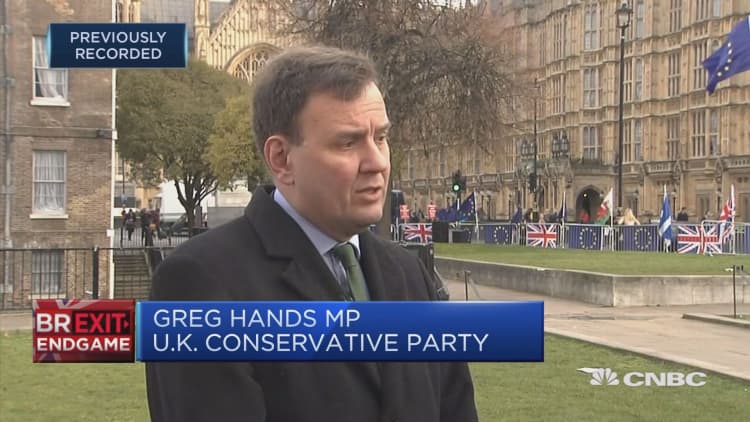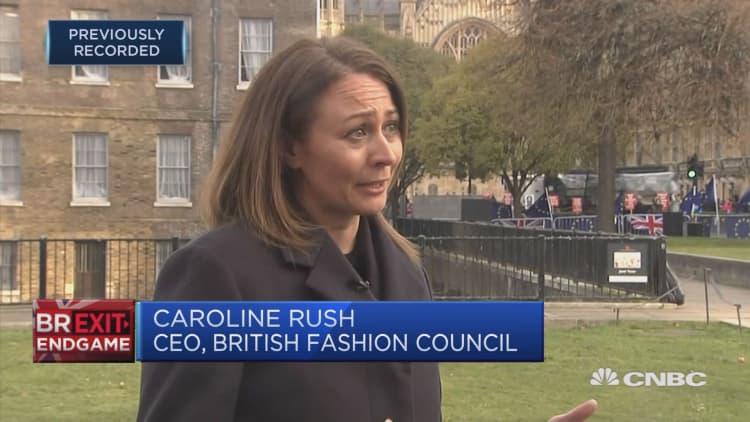A leading pro-Brexit member of Theresa May's Conservative Party has dismissed concerns that members of his hardline faction could attempt late on Thursday to defeat the government in a series of non-binding parliamentary votes focused on the progress of Brexit.
After May's negotiated withdrawal deal with Europe suffered a historic humbling in the House of Commons last month, a further parliamentary loss on Thursday evening could prove humiliating for a leader hobbled by her own party's differences.
As she seeks out concessions from her counterparts in Brussels to appease domestic critics, even a symbolic loss now could telegraph to senior EU officials and other European heads of state that she is unable to command a stable parliamentary majority that supports her current course of action.
With a little over six weeks until the designated deadline for Britain to exit the European Union, lawmakers are scheduled to debate and vote on a parliamentary motion tabled by May's government, as well as any of the several proposed amendments to that motion that the House of Commons speaker may decide to select.
The language of the motion itself essentially acknowledges the prime minister's request on Tuesday for more negotiating time, and also endorses her strategy of seeking changes to an unpopular provision of the withdrawal agreement she herself had signed off in December.

The government's motion had initially seemed uncontroversial to most MPs. But on Wednesday members of the hardline Conservative faction known as the European Research Group (ERG) began to protest one of its underlying premises.
The several dozen lawmakers have proved to be a political thorn in the prime minister's side over recent months, and some members appeared poised Wednesday night to vote against this seemingly innocuous motion because it implicitly endorsed a previous, non-binding parliamentary vote that indicated the British government should leave the European Union with some kind of deal.
That earlier vote, against a "no deal" scenario, which economists and executives alike have repeatedly warned would be catastrophically damaging to British trade and businesses, had quickly proven problematic for some pro-Brexit politicians. Several had actively endorsed that cliff-edge exit from Europe as the purest possible form of Brexit, while others insisted it must remain as a viable government option in order to maintain leverage in any divorce discussions with the EU, for whom "no deal" could also be damaging.
But ERG Chairman Jacob Rees-Mogg has now said that Thursday's votes are "not fundamentally important." In an interview with ITV News, he called that implicit endorsement in Thursday's parliamentary motion "a secondary issue rather than a primary one," and explained that it was for this reason that he thought it "highly unlikely that people will be voting against this motion."
Some political analysts have also insisted that Thursday's parliamentary votes are nothing more than symbolic.
"Fundamentally what really matters is the negotiations and the discussions in Brussels," said Marley Morris, a senior research fellow at the Institute for Public Policy Research. "These are just parliamentary games which are playing out, while people in Brussels kind of watch with some mixture of trepidation and horror really."

And as an ever growing chorus of investors and businesses inside and outside the U.K. have made clear, the ongoing lack of certainty remains the greatest challenge.
That is driven by an "awful lot of political noise, and that's really still continuing today," according to Moody's chief credit officer for EMEA, Colin Ellis.
"We don't expect that to clear up until there is an agreed position in the House (of Commons), and the problem is, at the moment, it's hard to see where we get there from where we are today."
The government has promised parliament its second meaningful vote on Brexit by February 27. The Labour party leader Jeremy Corbyn has tabled his own amendment ahead of Thursday's voting that could — if it is selected and passes — force the government to stick to that timeline, and thus provide some further clarity just a month before Britain's currently scheduled departure date.

